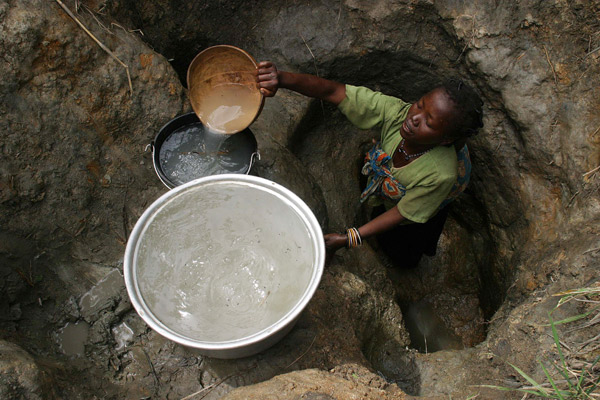Water Woes
Women Fetch the World’s Water
Throughout history, women have played a central role as stewards of water. According to the Food and Agriculture Organization of the United Nations (FAO), "Women are most often the collectors, users and managers of water in the household as well as farmers of crops. Women and children provide nearly all the water for the household in rural areas."
In urban areas, women are often in charge of accessing clean water and ensuring sanitation for their families. Women hold the knowledge around quality, location, reliability and storage of local water resources. So when water sources are contaminated or unavailable, women and children can be hit the hardest.
Kramer points out that Africa, in particular, faces some of the most acute and devastating water problems in the world. Women must endure the worst of these challenges.
- Rural women walk 10 miles or more every day to fetch water, on average. In the dry season they may walk twice this distance.
- Rural women typically carry 20-liter water containers, which weigh 44 lbs (20 kgs), the same as the baggage allowance on most airlines.
- In urban slums without access to clean water, women have to use dirty water from ponds and rivers, often polluted by factories, or they are charged large sums by water sellers.
- Some women face a daily threat of violence or rape when they travel long distances to fetch water.
- One in 10 girls drop out of school at puberty or skip school during menstruation because of improper sanitation.
- A woman living in a slum in Kenya pays five times what a woman in the U.S. pays for water even though U.S. woman, on average, makes 36 times more money per year.
Water Privatization Hurts Women the Most
Even in places where water is plentiful and clean, women are facing another obstacle: Privatization. In the last several decades, governments have outsourced the management and distribution of water to private companies. Private companies can charge whatever they like, often leading to price increases that hit poor women the hardest. According to the Women's Environment and Development Organization, privatization also results in water cut-offs, deteriorating water quality and health and sanitation hazards.
For example, on the outskirts of Cairo, Egypt, private water vendors sell water at five to 10 times the cost of government distributed water in other areas of the city -- and the water is delivered in unhygienic tankers.
Samia Galal Saad of Alexandria University explains, "Due to the poor water quality, bacterial, viral and parasitic diseases often strike children in rural areas as well as those who use contaminated canals and drains. Although some health services are available, women and children are usually the last to seek care because they lack transportation. With a 52 percent illiteracy rate, women also tend to be poorly informed about health issues."
In Egypt and, in many other parts of the world, women are rarely integrated in the planning, management or policy surrounding water distribution. Still, they organize.
Women Fight Back
In Kenya, women have formed local associations that work with municipalities to ensure that piped-water points are established within their reach. They have mobilized neighborhoods, municipalities and other partners to build water tanks, and have generated funds locally to pay for them, according to Nairobi-based Environment Liaison Centre International.
In Uruguay, the women-run neighborhood commission of the district of San Antonio successfully lobbied local authorities to maintain the community tap. Now the standpipe in the neighborhood not only supplies water to locals, but also to neighbors from other districts where standpipes have been removed or household water connections cut off due to the inability to pay the high water rates.
In the United States, urban women are fighting water privatization in Detroit, Michigan. Detroit's water department is a city-run agency. But when they hired a new manager from the private sector, customers were confronted with a radical change in policy. Under the new rules, the water department started cementing valves to permanently shut off the water supply of working-class women who couldn't pay their water bills.
Women associated with the Michigan Welfare Rights Organization, an advocacy union for those receiving public assistance, launched a public education campaign to inform women about their rights. Women participate in "Resurrection Marches" where they picket around the department's headquarters, with their water bills in hand, entering the offices to get their water turned back on or to avoid having it turned off at all.
Low-Tech Solutions to Clean Water
In addition to political organizing, technology holds some promise for alleviating women's water woes and transforming water conditions.
International NGOs like A Single Drop offer training in low-cost low-tech solutions to getting, and keeping water clean.
- Solar Pasteurization: When boiling water isn't possible, the sun can provide an equivalent alternative. Clear bottles of water can be purified after sitting in the sun for six hours.
- Collecting Rainwater: Tap water may cost money, but water from the sky is still free. Education programs on "harvesting" rainwater cover safe and efficient ways to collect, store and treat this sometimes overlooked resource.
- Home Water Filtration: Compact, effective home water filters have been available for decades, but their high cost puts them out of reach for many women. In one solution, easy to make with local resources, water is cleaned by being filtered through sand.
Additionally, seed capital is being made available to groups who launch water service projects and set up clean water microenterprises in their own communities.
Melinda Kramer of the Women's Earth Alliance contributed to the reporting.


